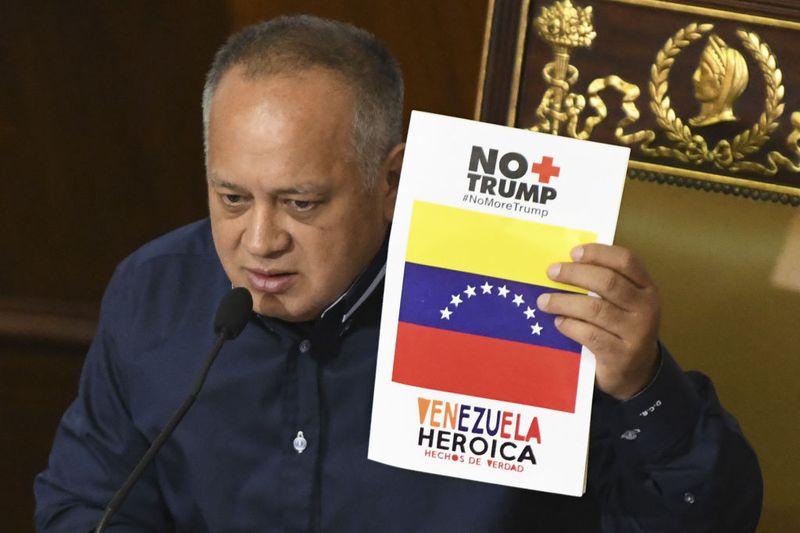The price of removing Nicolas Maduro from office
may be amnesty for his deputies | Opinion Eli Lake-Bloomberg

No one should take Venezuelan dictator Nicolas Maduro’s words at face value. That applies to his claims last week that his regime is in secret negotiations with “high-ranking” American officials.
His comments were almost certainly a gambit to divide the opposition during the on-again, off-again negotiations over new elections being brokered by the Norwegian government. They were a ploy to make the internationally recognized but largely powerless government of interim President Juan Guaido believe that U.S. President Donald Trump was negotiating behind its back.
That said, there is a kernel of truth buried in Maduro’s fiction. Trump also acknowledged talks at “a very high level” last week. U.S. National Security Adviser John Bolton has said these contacts are not authorized by Maduro, and are aimed at ushering in free elections.
So: America is talking to Maduro’s deputies — about how to get rid of Maduro.
What to make of this development? Obviously any strategy that hastens the demise of the Maduro regime is a good thing. If the apparatchiks who preach socialism are now looking to protect their fortunes and stay out of jail, that may mean the collapse of the regime is nigh.
At the same time, this back and forth highlight just how unsatisfactory the fall of Maduro is likely to be. His ouster will require the cooperation of his enablers — and the price of their cooperation, at a minimum, will be amnesty.
Guaido and his supporters have been keenly aware of this dilemma since January, when most of the Western Hemisphere recognized him as interim president of Venezuela. One of his first acts was to press the National Assembly to pass an amnesty law for civilian and military officials who worked to restore constitutional government. At the time, Human Rights Watch, which has documented much of the Maduro regime’s crimes, criticized the law for being dangerously vague and overbroad.
Back then, Guaido’s proposal was mainly theoretical. More than eight months into his efforts to oust Maduro, however, some details are coming into focus — namely, the kinds of scoundrels that will evade justice in exchange for turning on Maduro. As one senior U.S. official told me, the U.S. has delivered messages to Maduro’s deputies, often through intermediaries, that they are interested not in vengeance but only in an orderly transition to free and fair elections.
At the top of the amnesty list is former intelligence chief, General Manuel Ricardo Cristopher Figuera. He defected during the failed uprising on April 30. A week later, the Treasury Department removed sanctions on him.
Figuera, who eventually made his way to the U.S., in recent interviews has portrayed himself as an outsider shocked by the corruption and authoritarianism of the Maduro regime. But he also served for a decade as the deputy of Maduro’s military intelligence service, which has been credibly accused of torturing soldiers suspected of plotting a previous coup.
Another potential candidate for amnesty is the vice president of the ruling Socialist Party, Diosdado Cabello. This week, the Wall Street Journal and the Associated Press reported that he was in discussions with U.S. officials to prepare for free elections in a post-Maduro Venezuela. Cabello has denied these talks and a senior U.S. official told me this week that these discussions were not negotiations to bring Cabello into a post-Maduro government.
Cabello may have more modest ambitions. In 2018, the Treasury Department issued a press release accusing him of being “directly involved in narcotics trafficking activities” and announcing sanctions on him and three associates in his “corruption network.” In 2017, there were credible reports that Cabello had ordered an assassination of U.S. Senator Marco Rubio of Florida.
If Cabello makes the right decision now about Maduro, all those problems could go away. A Cabello defection would be a huge blow to Maduro’s regime, possibly the death knell. Cabello’s connections to the father of Venezuela’s socialist revolution, Hugo Chavez, go back to 1992, when he participated in the movement’s failed coup. His influence is such within Venezuela’s military that if he turns coat, many other officers will turn with him.
Cabello’s defection would put great pressure on Maduro to leave office, which would be an unambiguously positive development. But it would also be bittersweet news. The only way to bring Venezuela closer to freedom may be to allow one of its worst fiends to remain at large.
This column does not necessarily reflect the opinion of the editorial board or Bloomberg LP and its owners.
Eli Lake is a Bloomberg Opinion columnist covering national security and foreign policy. He was the senior national security correspondent for the Daily Beast and covered national security and intelligence for the Washington Times, the New York Sun and UPI. To contact the author of this story:
Eli Lake at [email protected]
Bron; Bloomberg

